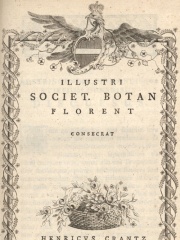

The Most Famous
BIOLOGISTS from Luxembourg
This page contains a list of the greatest Luxembourger Biologists. The pantheon dataset contains 1,097 Biologists, 2 of which were born in Luxembourg. This makes Luxembourg the birth place of the 36th most number of Biologists behind Türkiye, and Mexico.
Top 2
The following people are considered by Pantheon to be the most legendary Luxembourger Biologists of all time. This list of famous Luxembourger Biologists is sorted by HPI (Historical Popularity Index), a metric that aggregates information on a biography's online popularity.

1. Jules A. Hoffmann (b. 1941)
With an HPI of 71.62, Jules A. Hoffmann is the most famous Luxembourger Biologist. His biography has been translated into 54 different languages on wikipedia.
Jules Alphonse Nicolas Hoffmann (French pronunciation: [ʒyl ɔfman]; born 2 August 1941) is a Luxembourgish-French biologist. During his youth, growing up in Luxembourg, he developed a strong interest in insects under the influence of his father, Jos Hoffmann. This eventually resulted in the younger Hoffmann's dedication to the field of biology using insects as model organisms. He currently holds a faculty position at the University of Strasbourg. He is a research director and member of the board of administrators of the National Center of Scientific Research (CNRS) in Strasbourg, France. He was elected to the positions of Vice-President (2005–2006) and President (2007–2008) of the French Academy of Sciences. Hoffmann and Bruce Beutler were jointly awarded a half share of the 2011 Nobel Prize in Physiology or Medicine for "their discoveries concerning the activation of innate immunity". Hoffmann and Bruno Lemaitre discovered the function of the fruit fly Toll gene in innate immunity. Its mammalian homologs, the Toll-like receptors, were discovered by Beutler. Toll-like receptors identify constituents of other organisms like fungi and bacteria, and trigger an immune response, explaining, for example, how septic shock can be triggered by bacterial remains. In 2012, Hoffman was appointed as an Honorary Professor in the School of Biochemistry and Immunology at Trinity College Dublin.

2. Heinrich Johann Nepomuk von Crantz (1722 - 1799)
With an HPI of 63.20, Heinrich Johann Nepomuk von Crantz is the 2nd most famous Luxembourger Biologist. His biography has been translated into 21 different languages.
Heinrich Johann Nepomuk von Crantz (Roodt-sur-Eisch, Luxembourg, 25 November 1722 – 18 January 1799, Judenburg, Austria) was a botanist and a physician. In 1750 he obtained his doctorate of medicine in Vienna, where he was a pupil of Gerard van Swieten (1700–1772). He studied obstetrics in Paris and London. In Paris he was influenced by André Levret (1703–1780) and Nicolas Puzos (1686–1753). He was first married to Anna Susanne Petrasch and then to Magda Lena de Tremon. He had two sons and one daughter. He became a lecturer in obstetrics at St. Mary's Hospital in Vienna in 1754. From 1756 to 1774, he taught physiology and materia medica at the university in that city. He was the author of: Einleitung in eine wahre und gegründete Hebammenkunst (1756). Commentarius de rupto in partus doloribus a foetu utero (1756). Commentatio de instrumentorum in arte obstetricia historia utilitate et recta ac praepostera applicatione (1757). De systemate irritabilitatis (1761). Materia medica et chirurgica (three volumes, 1762) (Vol. 1 - 3 1765 Digital edition by the University and State Library Düsseldorf) De aquis medicatis principatus Transsylvaniae (1773). Die Gesundbrunnen der Österreichischen Monarchie (1777). He recommended better methods of hygiene for midwives. In addition to his work in medicine, he studied chemistry, botany, and the sources of mineral water. The plant genus Crantzia (Gesneriaceae) was named for him by Thomas Nuttall.
People
Pantheon has 2 people classified as Luxembourger biologists born between 1722 and 1941. Of these 2, 1 (50.00%) of them are still alive today. The most famous living Luxembourger biologists include Jules A. Hoffmann. The most famous deceased Luxembourger biologists include Heinrich Johann Nepomuk von Crantz.

